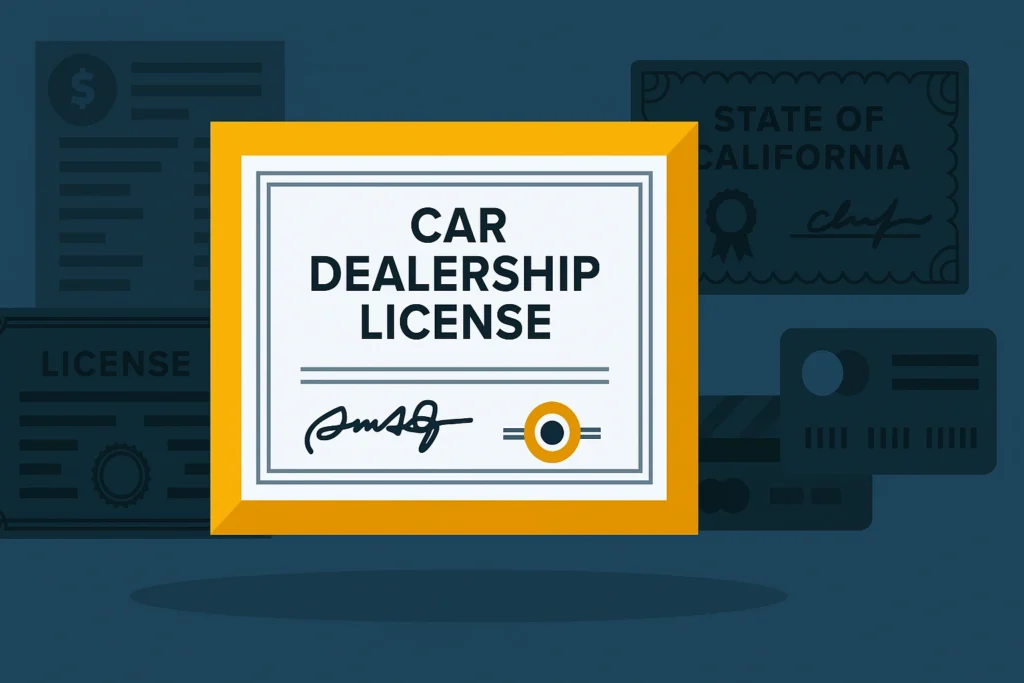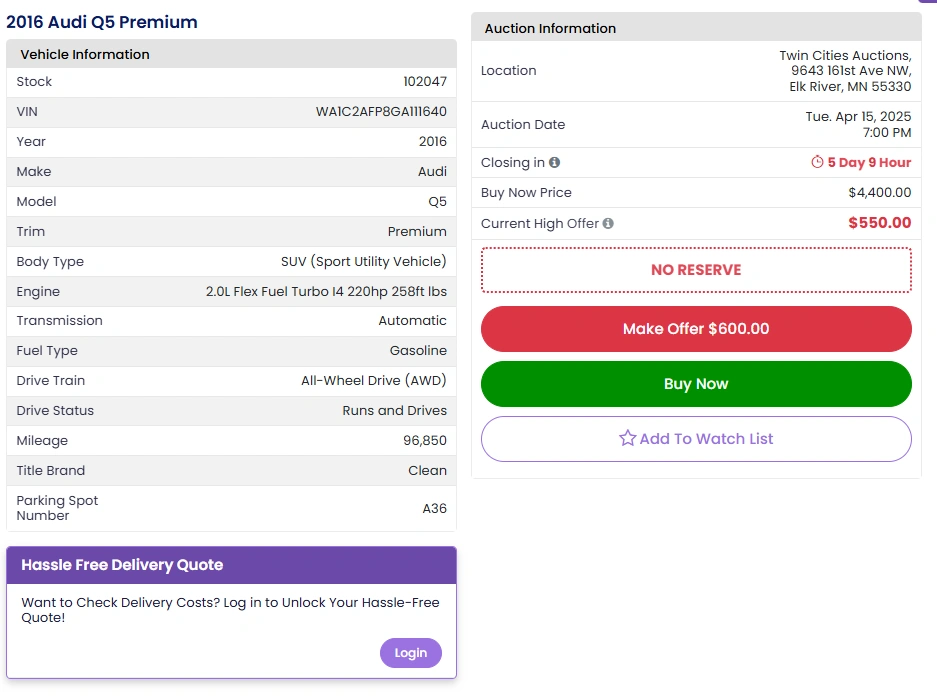Are you considering starting a used car dealership in California? The state offers great opportunities for entrepreneurs, but like many states, you need to go through a clear and structured process to get a used car dealer’s license.
Operating a dealership without the proper license can result in legal and financial penalties. However, once you understand the steps, you’ll be well on your way to running a successful business.
In this comprehensive guide, we will walk you through the process of getting a used car dealer’s license in California, explain the licensing requirements, and explore why auctions like Twin Cities Auctions in Minnesota are a great choice for sourcing your inventory.

Key Takeaways
- You must meet specific eligibility requirements and follow a step-by-step process to obtain a used car dealer’s license in California.
- The application process includes background checks, providing necessary documentation, completing a dealer education course, and passing an inspection.
- California allows you to sell up to two vehicles per year without a license. Selling more than that requires a dealer’s license.
- Auctions such as Twin Cities Auctions offer competitive prices and a wide variety of vehicles, which makes them an excellent option for sourcing inventory.
Step by Step Process: How to Get a Used Car Dealer’s License in California
Step 1: Meet Eligibility Requirements
Before applying for your license, make sure you meet the state’s basic eligibility requirements. These include:
- Minimum Age: You must be at least 18 years old.
- Criminal Background: A criminal background check is required. California disqualifies applicants who have felony convictions related to theft, fraud, or similar crimes. However, misdemeanors may not automatically disqualify you.
- Business Location: You must have a physical location for your dealership. The location should comply with local zoning laws and be large enough to house cars for sale. You need a permanent office for business operations.
- Insurance: Proof of liability insurance is required. This ensures that your business is protected in case of accidents or damages related to the vehicles you sell.
Step 2: Register Your Business
To legally operate your dealership in California, you need to:
- Register your business with the California Secretary of State.
- Obtain a Federal Employer Identification Number (EIN) from the IRS. This is needed for tax purposes.
- Register for a sales tax permit with the California Department of Tax and Fee Administration (CDTFA). This allows you to collect sales tax on vehicle transactions.
Step 3: Submit Your Application
Once you have your business registered, it’s time to submit your application for a used car dealer’s license through the California Department of Motor Vehicles (DMV). Your application must include:
- Personal information (name, address, contact details).
- Business information (name of dealership, location, ownership structure).
- Proof of business registration with the state.
- Proof of sales tax permit and liability insurance.
- Background check consent to ensure there are no disqualifying criminal records.
The DMV’s application form and guidelines are available on their official website: California DMV – Used Car Dealer License.
Step 4: Pay the Application Fee
Along with your application, you must pay a non-refundable fee. The cost of the application ranges from $175 to $800 depending on your type of dealership.
For example, a used car dealer’s license for a smaller dealership typically costs less than one for a larger business. Be sure to check the exact fee structure on the DMV’s website.
Step 5: Complete the Dealer Education Course
California requires all new car dealers, including used car dealers, to complete a dealer education course. This course covers a range of topics, such as:
- California Vehicle Code (state laws regarding car sales).
- Dealer responsibilities and liabilities.
- Consumer rights and protection laws.
- Title and registration procedures.
The course typically lasts 6 hours and can be completed online or in person. Once you finish the course, you’ll receive a certificate of completion, which must be submitted with your license application.
Step 6: Schedule a Dealership Inspection
After submitting your application and completing the dealer education course, you will need to schedule an inspection of your dealership location.
The DMV will send an inspector to ensure your business complies with local zoning laws, health and safety regulations, and other requirements.
Step 7: Wait for Approval
Once your inspection is approved, and all necessary paperwork is processed, you will receive your used car dealer’s license.
The process typically takes around 4 to 6 weeks. Be patient and ensure that all your documents are submitted correctly to avoid any delays.
Dealer Licensing Requirements in California
Here’s a summary of the key licensing requirements for used car dealerships in California:
| Requirement | Details |
| Age | Must be 18 years or older |
| Business Location | Must have a physical location for vehicle sales |
| Insurance | Proof of liability insurance is required |
| Background Check | Must pass a criminal background check |
| Dealer Education | Required completion of a 6-hour dealer education course |
| Application Fee | Ranges from $175 to $800 |
| Sales Tax Permit | Required to collect sales tax |
| Sales Limit | Can sell up to 2 cars per year without a license in California |
Why Auctions Are a Smart Choice for Vehicle Sales
When you’re building your inventory, using auctions can be a smart choice for sourcing vehicles. Twin Cities Auctions, based in Minnesota, is one such reputable auction house that offers a wide range of vehicles at competitive prices.
Key Benefits of Buying from Auctions:
- Wide Selection: Auctions like Twin Cities Auctions offer a variety of vehicles, from low-budget cars to high-end models.

- Competitive Pricing: Auctions often offer vehicles at prices below retail value, enabling dealers to maximize their profit margins.

- Transparency: Auctions provide full vehicle history reports, so you know exactly what you’re buying.

- Convenient Bidding: Many auctions offer online bidding for your convenience, making it easier to source vehicles without being physically present.
Twin Cities Auctions: A Smart Vehicle Sourcing Choice
For those in the automotive industry, Twin Cities Auctions offers an excellent platform for sourcing quality vehicles at competitive prices.
Whether you are just starting or expanding your business, this auction house provides transparency, competitive pricing, and a broad selection.
| Feature | Description |
| Inventory Variety | Wide range of cars, trucks, and SUVs available |
| Competitive Pricing | Below-market pricing allows for higher profit margins |
| Vehicle History Reports | Detailed history reports for every vehicle |
| Online Bidding | Convenient online bidding options for dealers |
| Financing Options | Financing available to help with inventory purchases |
Practical Tips for Sellers and Dealers
Once your used car dealership is up and running, here are some essential tips for running a successful business:
- Stay Compliant: Regularly check for updates to California’s vehicle sales laws to ensure you remain compliant with state regulations.
- Maintain Accurate Records: Keep thorough records of every vehicle you sell, including its condition, history, and the sales transaction details.
- Be Transparent with Customers: Honesty and transparency about the vehicles’ conditions, including any accidents or repairs, will help build trust with your customers and lead to repeat business.
Ready to Buy or Sell Your Car? No Dealer License Needed!
At Twin Cities Auctions, we simplify the process of buying and selling vehicles, making it straightforward and hassle-free. You don’t need a dealer license to participate—our online platform is open to the public, accommodating both first-time buyers and seasoned sellers.
Whether you’re upgrading your ride or selling your current vehicle, we provide the platform you need that offers a diverse range of vehicles and a transparent bidding process. Start your auction journey with us today!
Looking for more options? Explore our comprehensive list of all available car auctions across the United States. Your next deal might be just a click away!
FAQs
How many cars can I sell without a license in California?
In California, you can sell up to two vehicles per year without a license. If you sell more than that, you will need to obtain a used car dealer’s license.
What documents are required for a used car dealer’s license in California?
You will need to submit proof of business registration, proof of insurance, a completed background check form, a certificate of completion from the dealer education course, and other required documentation.
How long does it take to get a used car dealer’s license in California?
The licensing process generally takes about 4 to 6 weeks, from submission of your application to approval.
Do I need to take a dealer education course in California?
Yes, California requires all new car dealers, including used car dealers, to complete a 6-hour dealer education course.
How much does a used car dealer’s license cost in California?
The application fee for a used car dealer’s license in California ranges from $175 to $800, depending on the size and location of your dealership.
Can I sell cars online if I have a used car dealer’s license in California?
Yes, once you have your dealer’s license, you can sell cars online in California. However, you must comply with all state and local regulations.
What is the process for scheduling a dealership inspection in California?
Once your application and education course are complete, you will need to schedule an inspection with the California Department of Motor Vehicles (DMV) to ensure your location meets local regulations.
Where can I find inventory for my dealership in California?
Auctions like Twin Cities Auctions provide an excellent source for purchasing vehicles at competitive prices, giving you access to a wide variety of cars and trucks.
Source Links:
https://www.dmv.ca.gov/portal/vehicle-industry-services


